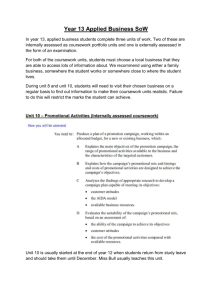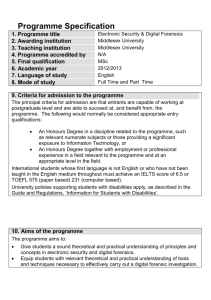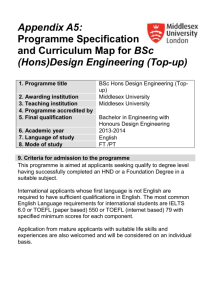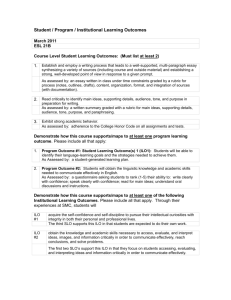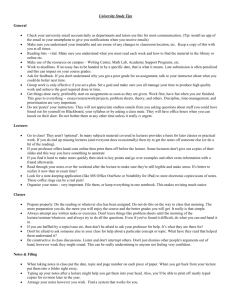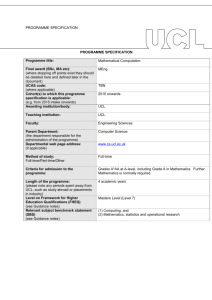Business Information Systems Management
advertisement
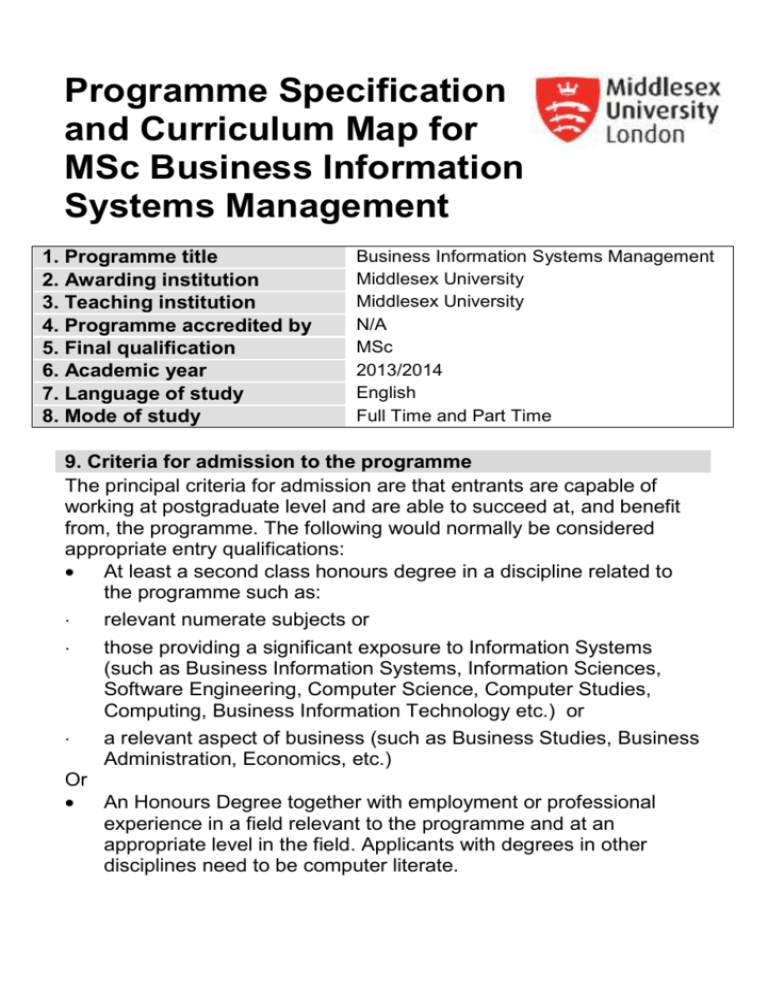
Programme Specification and Curriculum Map for MSc Business Information Systems Management 1. Programme title 2. Awarding institution 3. Teaching institution 4. Programme accredited by 5. Final qualification 6. Academic year 7. Language of study 8. Mode of study Business Information Systems Management Middlesex University Middlesex University N/A MSc 2013/2014 English Full Time and Part Time 9. Criteria for admission to the programme The principal criteria for admission are that entrants are capable of working at postgraduate level and are able to succeed at, and benefit from, the programme. The following would normally be considered appropriate entry qualifications: At least a second class honours degree in a discipline related to the programme such as: relevant numerate subjects or those providing a significant exposure to Information Systems (such as Business Information Systems, Information Sciences, Software Engineering, Computer Science, Computer Studies, Computing, Business Information Technology etc.) or a relevant aspect of business (such as Business Studies, Business Administration, Economics, etc.) Or An Honours Degree together with employment or professional experience in a field relevant to the programme and at an appropriate level in the field. Applicants with degrees in other disciplines need to be computer literate. International students whose first language is not English or who have not been taught in the English medium throughout, and whose first degree is not from a British university, must achieve an IELTS score of 6.5 or TOEFL 575 (paper based) 233 (computer based). Note: University policies supporting students with disabilities apply, as described in the University Regulations, ‘Information for Students with Disabilities’. 10. Aims of the programme The programme aims to: Give students an understanding of theories and principles that are imported from different disciplines to underpin the development and management of web based Information Systems. These theories/principles include cognitive psychology, legal and regulatory theory, ethics and professionalism, systems theory and organisational theory. Enable the students to recognise the centrality of Information Systems to business and to society at large through studying critically recent developments in Information Systems in Organisations. Equip students with relevant knowledge and skills necessary to analyse and understand business, organisational, social, technical and regulatory issues relevant to the evaluation and management of information systems. Develop an awareness of web-based information systems development and enable students to make informed choices on specific information systems technologies, methods and tools, in context (organisational type, scope and complexity). Equip students with the technical skills necessary to develop and implement strategies for the introduction and management of information systems and knowledge management programmes. Enable students to further their personal and professional development 11. Programme outcomes A. Knowledge and understanding On completion of this programme the successful student will have knowledge and understanding of: 1. Demonstrate an understanding of the nature of Information Systems within the context of underpinning systems theory, organisational theory, and core business principles necessary to evaluate and implement Information Systems in a variety of organisations. 2. Critically evaluate IS/IT strategy in various organisational contexts, applying systems theory, and assess the social impact and management challenges which IS/IT systems bring to these organisations. 3. Critically evaluate, measure and manage Information Systems quality. 4. Demonstrate an understanding of legal ethical and professional issues related to the management of Information Systems. 5. Demonstrate an understanding of the nature and use of webbased applications. 6. Assist organisations in developing effective Knowledge/data Management programmes to maintain competitive advantage in knowledge/data driven economies. Teaching/learning methods Students learn knowledge, gain understanding and develop cognitive skills and abilities through self directed, resource based learning, small group discussions, small group and individual exercises, lab sessions, demonstration software, on-line examples and the research project. Throughout their studies students are encouraged to undertake independent study both to supplement and consolidate what is being learnt and to broaden their individual knowledge and understanding of the subject. Critical evaluation and reflection engage the students in applying theory to practice. Assessment Methods Group and individual coursework, presentations and the unseen examination and the project thesis assess students’ knowledge and understanding. Outcomes 1, 2, 3, 4, 5 and 6 are assessed by a mixture of individual and group coursework, as well as unseen examinations and the research project. B. Cognitive (thinking) skills On completion of this programme the successful student will be able to: 1. Advise on the nature of Information Systems and their commercial possibilities 2. Apply various business and management theories in the development of suitable strategies for the introduction and management of Information Systems in various organisational contexts 3. Analyse, design, develop, implement, and evaluate web-based applications and use information in effective decision making 4. Advise on relevant legal, ethical and professional issues governing Information Systems and the use of Information Technology. 5. Evaluate, select and manage Information Systems 6. Identify critical Information Systems and Knowledge Management Systems success and failure factors and manage their quality Teaching/learning methods Students develop practical abilities through the teaching and learning programme outlined above. These abilities are also nurtured through small group discussions, small group and individual exercises, laboratory sessions, demonstration software, on-line problem-solving examples and the research project. Assessment Method Students’ practical abilities are principally assessed through coursework reports and the thesis report, with examination questions addressing aspects of practical abilities as appropriate to the subject material. Outcomes are assessed through coursework assignments using real case studies and in the research project. C. Practical skills On completion of the programme the successful student will be able to: 1. Select and use a variety of modes of discourse for effective communication, including graphical, written and oral, according to the needs of the intended audience. 2. Perform effectively as a member of a team in complex and diverse working environments that may arise where members of a team are brought together from diverse backgrounds in the pursuit of European and global integration. 3. Deploy advanced techniques and solutions from one specialised field of computing to another and from one complex problem situation to another. 4. Demonstrate a critical understanding of, and the ability to deploy effectively, a wide range of learning methods resources and technologies. 5. Manage their own learning and development demonstrating time management and organisational skills at a professional level. 6. Demonstrate self-direction and originality in learning and problem-solving in familiar and unfamiliar situations. 7. Appreciate the need for continuing professional development in recognition of the need for lifelong learning. Teaching/learning methods Students learn transferable skills through the teaching and learning programme outlined above. Although not all the skills are explicitly taught, they are nurtured and developed throughout the programme, which is structured and delivered in such a way as to promote this process. Assessment Method Students’ transferable skills are assessed as follows: Outcome 1 is assessed through coursework, reports, examinations, presentations and the project report. Outcome 2 is assessed through group coursework and reports. Outcome 3 is assessed primarily through examinations. Outcome 4 is assessed through coursework. Outcomes 5 and 6 are assessed primarily through the research project report. Outcomes 6 and 7 are assessed through individual coursework involving critical analysis and presentation of relevant current research issues 12. Programme structure (levels, modules, credits and progression requirements) 12. 1 Overall structure of the programme Please refer to the ‘Your Programme’ section 12.2 Levels and modules Level 7 COMPULSORY OPTIONAL Students must take all of the following: BIS4410: Knowledge Management Strategies BIS4408: Information Systems Quality Management BIS4435: Data Management for Decision Support BIS4425: Regulation of Electronic Commerce and Information technology BIS4430: Information Systems Strategy and Management BIS4992: Postgraduate Computing Project PROGRESSION REQUIREMENTS Students must pass all taught modules before they can progress onto the project 12.3 Non-compensatable modules (note statement in 12.2 regarding FHEQ levels) Module level Module code 13. Curriculum map See Curriculum Map attached 14. Information about assessment regulations Information on how the University formal assessment regulations work, including details of how award classifications are determined, can be found in the University Regulations at http://www.mdx.ac.uk/regulations/gradecriteriaguide.aspx Practical aspects of the programme are often assessed via coursework that may be carried out using specialist software and may include lab tests. Theoretical material is assessed by coursework and examinations. Grades are awarded on the standard University scale of 1–20, with Grade 1 being the highest. To pass a module all components, both coursework and examination, must be passed individually with a minimum grade of 16. Failure in one of the components will result in the failure of the module. For additional information on assessment and how learning outcomes are assessed please refer to the individual module narratives for this programme. 15. Placement opportunities, requirements and support (if applicable) 16. Future careers (if applicable) All programmes in the School of Science and Technology – their curricula and learning outcomes – have been designed with an emphasis on currency and the relevance to future employment. The majority of graduates are employed in posts relevant to the subjects covered. Over 20% of students pursue further postgraduate study or research. The employer links with the School are encouraged in a number of ways e.g. by inviting practitioners from industry as guest speakers in lectures; through links with companies where students are employed as part of their Industrial placement and through alumni both in the UK and overseas Campus Careers Offices can be found on each campus for advice, support and guidance – or go to http://www.mdx.ac.uk/campus/support/careers/index.asp 17. Particular support for learning (if applicable) The School’s Teaching and Learning Strategy is compliant with those of the University, in seeking to develop learner autonomy and resource-based learning. In support of the students learning experience: All new students go through an induction programme and some have early diagnostic numeric and literacy testing before starting their programme. Learning Resources (LR) provide workshops for those students needing additional support in these areas. Students are allocated a personal email account, secure networked computer storage and dial-up facilities New students are provided with a hard copy of the schools Subject Handbook at enrolment (electronic copies for all students can also be found at UniHub. If you require a hard copy of this Subject Handbook please request them from Thespina Brothwell (t.brothwell@mdx.ac.uk or 020 8411 4830) New and existing students are given module handbooks for each module they study. Soft copies of all module handbooks can be found on MyUniHub. Web-based learning materials are provided to further support learning Extensive library facilities are available on all campuses. These pages are available as learning resources through the Oasis system Students can access advice and support on a wide range of issues from the UniHelp helpdesk. Student Advisers aligned to subject areas offer confidential one to one advice and guidance on programme planning and regulations Placements are supported by Campus Placement Offices and School academics; please refer to section 19 of this programme specification High-quality specialist network, software, digital and wireless laboratories equipped with industry standard software, hardware and tools as appropriate, for formal teaching as well as self-study. Middlesex University is a Cisco Local Academy and a Xilinx University partner Access to campus based teaching and learning support drop in sessions, arranged by the school to provide assistance and guidance Tutorial sessions for each module are provided for additional teaching support Formative feedback is given on completion of student coursework Past exam papers with solutions and marking schemes for all modules are available for students in module handbooks and at UniHub Research activities of academic staff feed into the teaching programme, which can provide individual students with ad-hoc opportunities to work with academics on some aspect of research Middlesex University encourages and supports students with disabilities. Some practical aspects of Engineering and Information Sciences programmes may present challenges to students with particular disabilities. You are encouraged to visit our campuses at any time to evaluate facilities and talk in confidence about your needs. If we know your individual needs we’ll be able to provide for them more easily. For further information contact the Disability Support Service (email: disability@mdx.ac.uk) or contact Sobia Hussain on 020 8411 4945. 18. JACS code (or other relevant coding system) G500 19. Relevant QAA subject benchmark group(s) Computing 20. Reference points The following reference points were used in designing the programme: QAA Framework for Higher Education Qualifications in England, Wales and Northern Ireland QAA Computing subject benchmark statement Towards Benchmarking Standards for Taught Masters Degrees in Computing (sponsored by CPHC), May 2004 QAA/CLQE guidelines for programme specifications QAA Code of Practice for the assurance of academic quality and standards in HE University Policy, Regulations and Guidelines Middlesex University and School of Engineering and Information Sciences Teaching Learning and Assessment policies and strategies 21. Other information Middlesex University has formal links with 250 institutions world-wide, including student exchange agreements with more than 100 institutions. Currently a number of students both from the UK/EU and overseas take part in such exchanges. For further details please visit http://www.europe.mdx.ac.uk/ or contact Mark Springett (M.Springett@mdx.ac.uk). Please note programme specifications provide a concise summary of the main features of the programme and the learning outcomes that a typical student might reasonably be expected to achieve if s/he takes full advantage of the learning opportunities that are provided. More detailed information about the programme can be found in the programme handbook and the University Regulations. Curriculum map for MSc Business Information Systems Management This section shows the highest level at which programme outcomes are to be achieved by all graduates, and maps programme learning outcomes against the modules in which they are assessed. Programme learning outcomes Knowledge and understanding A1 Demonstrate an understanding of the nature of A2 A3 Information Systems within the context of underpinning systems theory, organisational theory, and core business principles necessary to evaluate and implement Information Systems in a variety of organisations. Critically evaluate IS/IT strategy in various organisational contexts, applying systems theory, and assess the social impact and management challenges which IS/IT systems bring to these organisations. Critically evaluate, measure and manage Information Systems quality. Practical skills C1 Select and use a variety of modes of discourse for effective communication, including graphical, written and oral, according to the needs of the intended audience. C2 C3 Perform effectively as a member of a team in complex and diverse working environments that may arise where members of a team are brought together from diverse backgrounds in the pursuit of European and global integration. Deploy advanced techniques and solutions from one specialised field of computing to another and from one A4 Demonstrate an understanding of legal ethical and professional issues related to the management of Information Systems. C4 A5 Demonstrate an understanding of the nature and use of web-based applications. C5 A6 Assist organisations in developing effective Knowledge/data Management programmes to maintain competitive advantage in knowledge/data driven economies C6 complex problem situation to another. Demonstrate a critical understanding of, and the ability to deploy effectively, a wide range of learning methods resources and technologies. Manage their own learning and development demonstrating time management and organisational skills at a professional level. Demonstrate self-direction and originality in learning and problem-solving in familiar and unfamiliar situations. Appreciate the need for continuing professional development in recognition of the need for lifelong learning. A7 C7 Cognitive skills B1 Advise on the nature of Information Systems and Graduate Skills D1 B2 B3 their commercial possibilities Apply various business and management theories in the development of suitable strategies for the introduction and management of Information Systems in various organisational contexts Analyse, design, develop, implement, and evaluate web-based applications and use D2 D3 B4 information in effective decision making Advise on relevant legal, ethical and professional issues governing Information Systems and the use of Information Technology. D4 B5 Evaluate, select and manage Information Systems D5 B6 Identify critical Information Systems and Knowledge Management Systems success and failure factors and manage their quality D6 Programme outcomes A1 A2 A3 A4 A5 A6 B1 B2 Highest level achieved by all graduates B3 B4 B5 B6 C1 C2 C3 C4 C5 C6 C7 7 7 7 7 7 7 7 7 7 7 7 7 7 7 7 7 7 7 7 Module Title Module Code and Level Information Systems Strategy and Management Information Systems Quality Management Regulation of Electronic Commerce and Information Technology Knowledge management Strategies Data management for decision support Postgraduate Computing Project * BIS4430 Programme outcomes A1 A2 A3 A4 A5 A6 A7 B1 B2 B3 B4 B5 B6 C1 C2 C3 C4 C5 C6 x x x x x x x x x x BIS4408 x x x x x x x x BIS4425 x x x x x BIS4410 x x x x x x x x x x x x x x x x x x BIS4435 x x x BIS4992 x x Project * - Depending on the focus of the project several other learning outcomes will be achieved and assessed
